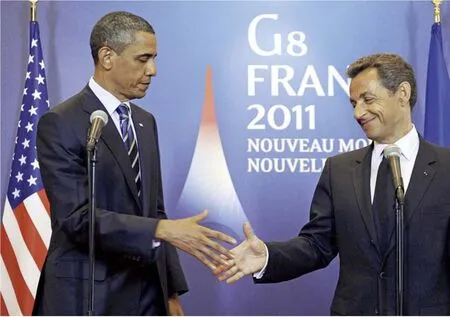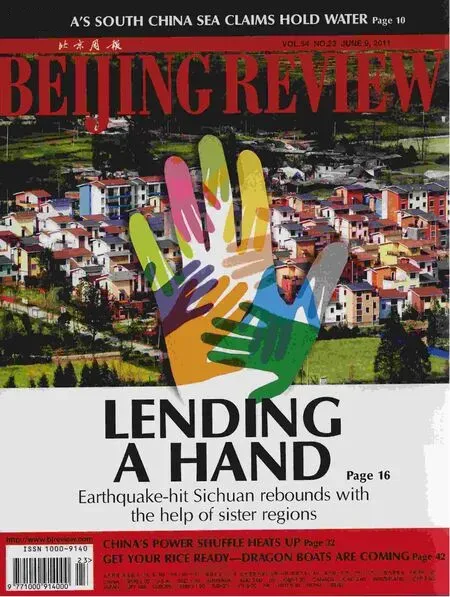G8 Struggles for Relevance
2011-10-14ByKERRYBROWN
By KERRY BROWN
G8 Struggles for Relevance
By KERRY BROWN
The world’s most powerful countries assess their dwindling influence

The first meeting of the Group of Eight (G8) countries, then the G7, was convened by French President Valéry Giscard d’Estaing, in the 1970s. Four decades on, the world has changed massively. But the return of the G8 to the coast of northern France under the presidency of France is a moment to think about the function and future of the G8 in a world where more work is done via the G20 or other forums.
Challenges
For many in the G8, they are meeting at a time of internal and external challenges. President Nicolas Sarkozy of France is facing re-election next year. The man who was likeliest to be his chief opponent in next year’s elections, Dominique Strauss-Kahn, is now on bail in New York awaiting trial on sexual assault charges. Even so, Sarkozy is suffering from historic lows in the opinion polls.
U.S. President Barack Obama is also up for re-election in 2012. His chances have been enhanced by the recent death of Osama Bin Laden. Even so, continuing unemployment and the huge problems of dealing with government expenditure mean that, as one commentator said, it will be the price of food and petrol, not the death of the world’s most wanted terrorist, that secures his second term in the White House.
In Italy, Prime Minister Silvio Berlusconi remains embroiled in legal problems. Japan is just emerging from the devastating combination of a massive tsunami that killed thousands of people and the immense challenges of the Fukushima nuclear disaster.
Even Germany, with its relatively strong growth rate in the last few months, remains distracted by continuing crises in the euro zone. Greece’s problems have shown the real possibility of growing deeper in coming weeks, with further IMF and EU intervention.
Symbolically, Sarkozy in his statement at the G8 Summit referred to his “excellent meeting” with Russian President Dmitry Medvedev. One of the most exciting announcements during the meeting was the urge to conclude talks for Russia’s entry into the WTO by the end of 2011.
Focuses
The declaration issued at the close of the summit referred to a raft of issues on which G8 leaders agreed. Some of these were expressions of mutual support. Japan’s tragic recent events were accorded special attention, with the full support of the other states in helping it rebuild its economy and damaged infrastructure, and address its immense nuclear issues.
France looks on this with particular engagement, because so much of its energy also comes from nuclear power. Germany was much more opposed, with Chancellor Angela Merkel halting further development of nuclear power station building soon after the crisis in Japan began.
The focus on nuclear energy and safety—unsurprisingly—took up a whole annex of the final declaration, connected to the 25th anniversary of the massive nuclear accident in Chernobyl and ongoing support for dealing with this. This acted as reminder that nuclear power, when it goes wrong, has an impact decades afterwards.
G8 leaders were able to mark an improvement in their economic positions since the time they last met. But the challenges of returning to anything resembling a full recovery remain, with job creation a particular concern. The UK’s ruling coalition government, in particular, during Obama’s visit to London just before the G8 Summit, were seeking his support for their deep cuts to government spending in order to address a 12-percent defcit.
While he stopped short of explicit endorsement, Obama did say the need for“fiscal consolidation” and “dealing with debt” were important. He himself is facing opposition Republican demands for massive cuts. But the UK remains the member of the G8 with the most radical program so far.
This gave extra force to British Prime Minister David Cameron’s most noticeable intervention in which he implicitly criticized other members of the group for their failure to devote enough of their GDP for assistance to developing countries. Arguing against a meeting of “men in suits” who spoke a lot, and did little, Cameron said the UK viewed the 0.7 percent of its GDP devoted to aid work in developing countries as a wise investment, helping global growth, and preventing the rise of destabilizing, radical groups dominating politics in failing regimes.
Statistically, with the United Statescommitting less than 0.3 percent of GDP to development budgets overseas, and France, Germany and Italy all falling well below the UK fgure, Cameron had a point. This has not stopped criticism in the UK of his ring fencing the aid budget and health budgets at a time when all other areas of public expenditure are under attack.

XINhUA/AFP
Global issues
International events for the G8 were mostly focused on the ongoing NATO-led campaign in Libya to protect citizens against the unrest there. Expressing strong support for the recent transitions to new governments in Egypt and Tunisia, the final declaration said all members wanted to see “the common goals of developing the rule of law and citizen engagement.”
The most pressing issue, however, was to secure ongoing support for UN resolutions 1970 and 1973, and for these, for the frst time, Russia expressed support, despite abstaining during the vote itself in April. Condemning the use of violence to repress protests in Syria, the G8 managed to maintain a unifed position. But the challenges of maintaining pressure on a deeply entrenched Colonel Muammar Gaddafi in Libya were not understated, and while Sarkozy said the main objective was simply “to see him go,”there remain many questions about how long this would take, and what would be in place if and when it happened.
One of the most powerful and unexpected issues that occurred in the background was the issue of who might replace Strauss-Kahn as the IMF chief, since his resignation earlier in May. Traditionally, the leadership of the IMF has fallen to a European. They are, after all, the largest source of funds. But the increasing debate about how representative this is in a period in which the EU proportion of GDP is falling, and the systems of global governance need to become more representative, would not go away.
One reporter asked Sarkozy why it looked increasingly likely that current French Finance Minister Christine Lagarde was going to be rewarded with the job, despite powerful candidates from outside the United States and Europe. Sarkozy replied this was a decision for the board of the IMF, and that in any case, the EU had already conceded 5 percent of its voting rights to non-EU members. Even so, this issue captured the changes happening in the world, with a larger voice to actors well outside the EU, and the continuing need to reform the global architecture of decision making.
As a further sign of this, the issues of climate change, with the aspiration of reducing carbon dioxide emissions globally by 50 percent from current levels, and support for research and development, were addressed in language that showed these were collaborative aspirations, and that their successful implementation lay far beyond the G8.
Sarkozy had in particular sponsored a focus on the Internet, and the meeting was attended by the key leaders of Google, Facebook and Twitter. Sarkozy spoke of the need to encourage Internet players to “have imperatives in terms of security, intellectual property and even digital taxation.” The challenging role of the Internet as a massive enabler of economic growth, and yet a highly disruptive player in terms of intellectual property rights, is likely to be a central debate in the years ahead.
One observer said this had been a “good G8.” This was despite fears it would be looked upon as an increasingly irrelevant event. Perhaps most importantly, the next one will be held in the United States next year, at a critical time in Obama’s presidency. Dates so far have not been set but for obvious reasons are likely to be in the months around November when the elections take place.
Perhaps the G8 this time has demonstrated to its most powerful member it has continuing relevance and that it should be maintained. In any case, it has to ft in closely with the agendas of other global gatherings.
(Viewpoints in this article do not necessarily represent those ofBeijing Review)
The author is a senior research fellow with Chatham House, London

XINhUA
